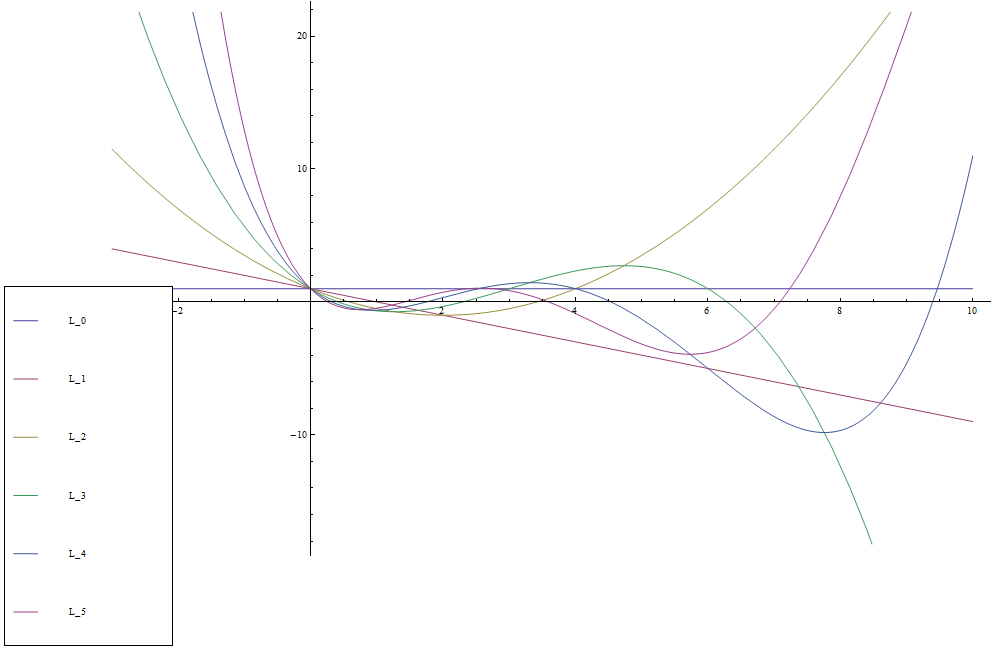Difference between revisions of "Laguerre L"
From specialfunctionswiki
| (14 intermediate revisions by the same user not shown) | |||
| Line 1: | Line 1: | ||
| − | Laguerre | + | __NOTOC__ |
| − | $$ | + | The Laguerre polynomial of order $n$, $L_n$, is given by |
| − | + | $$L_n(x) = \displaystyle\sum_{k=0}^n \dfrac{(-1)^kn!}{(n-k)!(k!)^2}x^k.$$ | |
| − | $$L_n(x) = \displaystyle\sum_{k=0}^n (-1)^ | + | |
The first few Laguerre polynomials are given by | The first few Laguerre polynomials are given by | ||
$$\begin{array}{ll} | $$\begin{array}{ll} | ||
| Line 13: | Line 13: | ||
\end{array}$$ | \end{array}$$ | ||
| − | + | <div align="center"> | |
| − | + | <gallery> | |
| + | File:Laguerrepolynomial.png|Graph of $L_n$ for $n=0,1,2,\ldots,5$ on $[-3,10]$. | ||
| + | </gallery> | ||
| + | </div> | ||
=Properties= | =Properties= | ||
| − | < | + | [[Generating function for Laguerre L]]<br /> |
| − | + | [[L n(x)=(e^x/n!)d^n/dx^n(x^n e^(-x))]]<br /> | |
| − | + | [[L n(0)=1]]<br /> | |
| − | < | + | [[L n'(0)=-n]]<br /> |
| − | < | + | [[Orthogonality of Laguerre L]]<br /> |
| − | </ | + | [[(n+1)L (n+1)(x) = (2n+1-x)L n(x)-nL (n-1)(x)]]<br /> |
| − | </ | + | [[xL n'(x)=nL n(x)-n L (n-1)(x)]]<br /> |
| − | + | [[L n'(x)=-Sum L k(x)]]<br /> | |
| − | |||
| − | |||
| − | |||
| − | |||
| − | |||
| − | |||
| − | </ | ||
| − | + | =See also= | |
| − | + | [[Associated Laguerre L]] | |
| − | |||
| − | |||
| − | |||
| − | |||
| − | |||
| − | |||
| − | + | =References= | |
| − | + | * {{BookReference|Special Functions for Scientists and Engineers|1968|W.W. Bell|prev=findme|next=Generating function for Laguerre L}}: $(6.3)$ | |
| − | |||
| − | |||
| − | |||
| − | |||
| − | |||
| − | + | {{:Orthogonal polynomials footer}} | |
| − | |||
| − | |||
| − | |||
| − | |||
| − | |||
| − | |||
| − | + | [[Category:SpecialFunction]] | |
| − | |||
| − | |||
| − | |||
| − | |||
| − | |||
| − | |||
Latest revision as of 14:37, 15 March 2018
The Laguerre polynomial of order $n$, $L_n$, is given by $$L_n(x) = \displaystyle\sum_{k=0}^n \dfrac{(-1)^kn!}{(n-k)!(k!)^2}x^k.$$
The first few Laguerre polynomials are given by $$\begin{array}{ll} L_0(x) &= 1 \\ L_1(x) &= -x+1 \\ L_2(x) &= \dfrac{1}{2}(x^2-4x+2) \\ L_3(x) &= \dfrac{1}{6}(-x^3+9x^2-18x+6) \\ L_4(x) &= \dfrac{1}{24}(x^4-16x^3+72x^2-96x+24)\\ \vdots \end{array}$$
Properties
Generating function for Laguerre L
L n(x)=(e^x/n!)d^n/dx^n(x^n e^(-x))
L n(0)=1
L n'(0)=-n
Orthogonality of Laguerre L
(n+1)L (n+1)(x) = (2n+1-x)L n(x)-nL (n-1)(x)
xL n'(x)=nL n(x)-n L (n-1)(x)
L n'(x)=-Sum L k(x)
See also
References
- 1968: W.W. Bell: Special Functions for Scientists and Engineers ... (previous) ... (next): $(6.3)$
